Contents
Guide
Pagebreaks of the print version
UNDERSTANDING THE AGE OF TRANSITIONAL JUSTICE

GENOCIDE, POLITICAL VIOLENCE, HUMAN RIGHTS SERIES
Edited by Alexander Laban Hinton, Stephen Eric Bronner, and Nela Navarro
Nanci Adler, ed., Understanding the Age of Transitional Justice: Crimes, Courts, Commissions, and Chronicling
Alan W. Clarke, Rendition to Torture
Lawrence Davidson, Cultural Genocide
Daniel Feierstein, Genocide as Social Practice: Reorganizing Society under the Nazis and Argentinas Military Juntas
Alexander Laban Hinton, ed., Transitional Justice: Global Mechanisms and Local Realities after Genocide and Mass Violence
Alexander Laban Hinton, Thomas La Pointe, and Douglas Irvin-Erickson, eds., Hidden Genocides: Power, Knowledge, Memory
Douglas A. Kammen, Three Centuries of Conflict in East Timor
Walter Richmond, The Circassian Genocide
Victoria Sanford, Katerina Stefatos, and Cecilia M. Salvi, eds., Gender Violence in Peace and War: States of Complicity
Irina Silber, Everyday Revolutionaries: Gender, Violence, and Disillusionment in Postwar El Salvador
Samuel Totten and Rafiki Ubaldo, eds., We Cannot Forget: Interviews with Survivors of the 1994 Genocide in Rwanda
Anton Weiss-Wendt, A Rhetorical Crime: Genocide in the Geopolitical Discourse of the Cold War
Ronnie Yimsut, Facing the Khmer Rouge: A Cambodian Journey
UNDERSTANDING THE AGE OF TRANSITIONAL JUSTICE
Crimes, Courts, Commissions, and Chronicling
EDITED BY
NANCI ADLER

RUTGERS UNIVERSITY PRESS
New Brunswick, Camden, and Newark, New Jersey, and London
Library of Congress Cataloging-in-Publication Data
Names: Adler, Nanci, editor.
Title: Understanding the age of transitional justice : crimes, courts, commissions, and chronicling / edited by Nanci Adler.
Description: New Brunswick, New Jersey : Rutgers University Press, 2018. | Series: Genocide, political violence, human rights | Includes bibliographical references and index.
Identifiers: LCCN 2017055139 | ISBN 9780813597775 (hardback : alk. paper) | ISBN 9780813597768 (paperback : alk. paper)
Subjects: LCSH: Political crimes and offenses. | Transitional justice. | Truth commissions. | BISAC: POLITICAL SCIENCE / Political Freedom & Security / Human Rights. | LAW / International. | SOCIAL SCIENCE / Criminology. | LAW / Judicial Power.
Classification: LCC K5250 .U53 2018 | DDC 340/.115dc23
LC record available at https://lccn.loc.gov/2017055139
A British Cataloging-in-Publication record for this book is available from the British Library.
This collection copyright 2018 by Rutgers, The State University of New Jersey
Individual chapters copyright 2018 in the names of their authors
All rights reserved
No part of this book may be reproduced or utilized in any form or by any means, electronic or mechanical, or by any information storage and retrieval system, without written permission from the publisher. Please contact Rutgers University Press, 106 Somerset Street, New Brunswick, NJ 08901. The only exception to this prohibition is fair use as defined by U.S. copyright law.
 The paper used in this publication meets the requirements of the American National Standard for Information SciencesPermanence of Paper for Printed Library Materials, ANSI Z39.48-1992.
The paper used in this publication meets the requirements of the American National Standard for Information SciencesPermanence of Paper for Printed Library Materials, ANSI Z39.48-1992.
www.rutgersuniversitypress.org
Manufactured in the United States of America
CONTENTS
NANCI ADLER
VLADIMIR PETROVI
WILLIAM A. SCHABAS
JEREMY SARKIN
STEPHAN PARMENTIER, MINA RAUSCHENBACH, AND MAARTEN VAN CRAEN
RICHARD ASHBY WILSON
THIJS B. BOUWKNEGT
NICOLE L. IMMLER
CHRISTIAN AXBOE NIELSEN
TIMOTHY WILLIAMS
KJELL ANDERSON
UNDERSTANDING THE AGE OF TRANSITIONAL JUSTICE
NANCI ADLER
Since Nuremberg, and more pronouncedly since the move toward democratic rule in Africa and Latin America in the 1980s, there has been a rise in understanding that bad pasts need to be institutionally addressed in order to create good futures. It has now become the norm that postrepressive, postconflict, postauthoritarian successor states confrontor support the process of confrontingthe crimes of their predecessor repressive regimes, both for the victims and for society as a whole. We may mark such an advance in sociocultural evolution as the Age of Transitional Justice. The expectation that an array of legal and nonlegal measures will be undertaken in the aftermath of mass political crimes is intended to provide a vital course correction to recurrent cycles of violence and impunity.
Transitional justice has generated a variety of strategic and tactical approaches for redressing often irreparable harms. These have included: international criminal tribunals, national or local legal proceedings, truth commissions, restitution, the accurate revision of history, public apologies, the establishment of monuments and museums, and official commemorations. Each of these, in different ways, attempts to incorporate the lived and narrated experiences of the victims, the witnesses, and the perpetrators. Such narratives bring the crimes into a shared public domain where they can be co-processed and critically evaluated.
The outcome of the convergence of multilevel narratives produced by many people and disparate groups can result only in an approximation of the full-scale of the targeted events. Nevertheless, even as we recognize these limitations, real things happen to real people who frame them as authentic experiences. While their narrative reconstruction of events is subjected to their interpretive framework, so, too, are the assessments of judges, truth commissioners, the public, the media, and opinion-makers alike.
Twenty years after the operation of one of the most prominent truth commissionsthe South African Truth and Reconciliation Commissionand, now, as the International Criminal Tribunal for the former Yugoslavia (ICTY) and the International Criminal Tribunal for Rwanda (ICTR) (both U.N. ad hoc tribunals) have wound down and closed, we are entering a new phase, one in which we are well-positioned to scrutinize the processes as well as the products of the age of transitional justice, even if only as a work in progress. Transitional justice is young in age and beset by growing pains, but we have gained some deeper understanding of the differential efficacy of transitional justice mechanisms, as well as the records they have produced. Pablo de Greiff, U.N. Special Rapporteur on truth, justice, reparation, and guarantees of non-recurrence, has found cause for celebration in the fact that in the short span of twenty to thirty years, truth-seeking and justice-seeking have consolidated their efforts and have come to include more victim and gender participation. There is, however, less to be hailed when it comes to the fields engagement with impact issues, that is, what changes, improvements, and/or reconciliation these efforts actually brought to the affected, divided societies. Indeed, the consequences of transitional justice mechanisms are still unfolding. We are still in the early stages of exploring posttransitional justice trajectories and identifying the impediments to progress, but two obstacles that stand out are the challenges to amnesties and to some of the U.N. and Hague courts rulings. We can infer that these are reliable indicators of a larger disconnect and that more obstacles await.


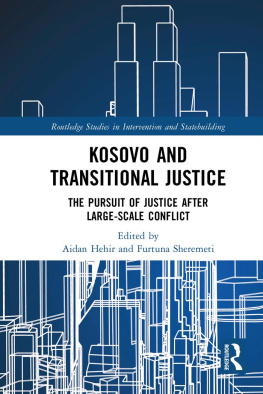
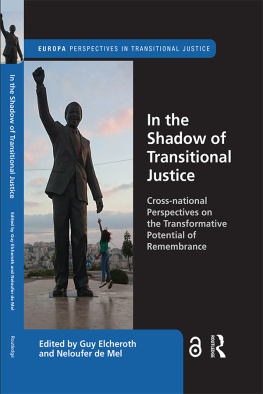
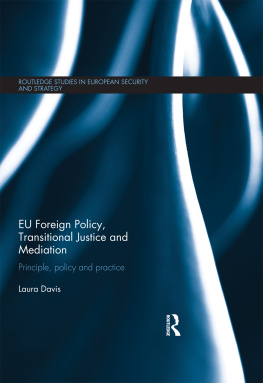
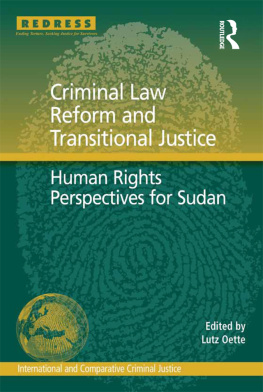
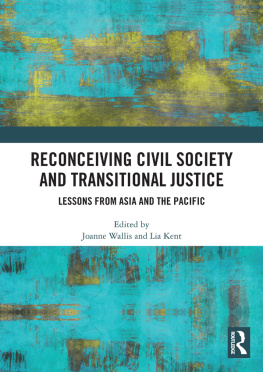
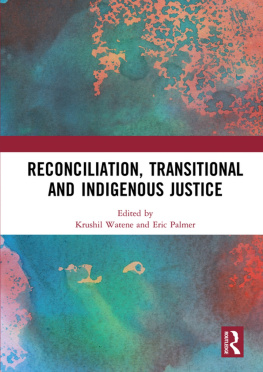
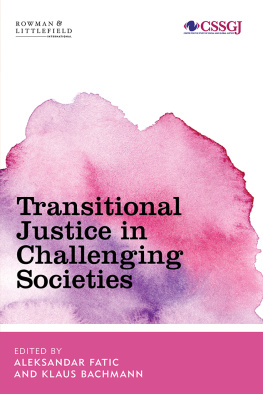
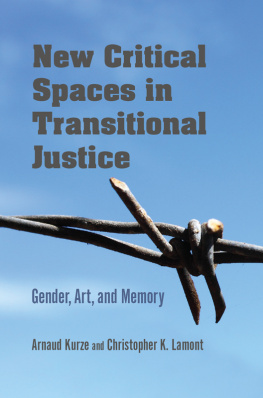
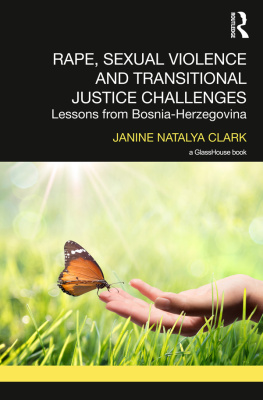
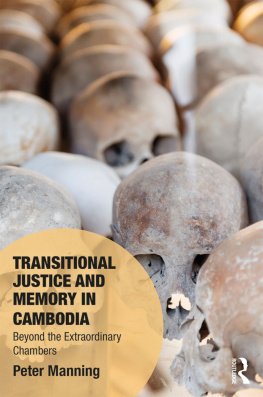
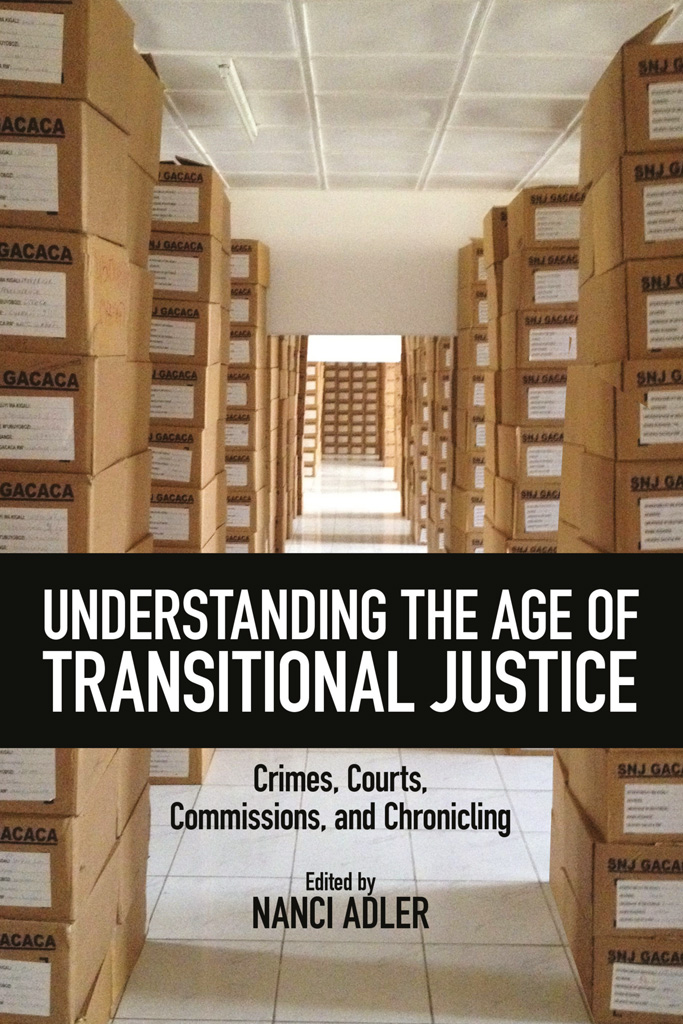


 The paper used in this publication meets the requirements of the American National Standard for Information SciencesPermanence of Paper for Printed Library Materials, ANSI Z39.48-1992.
The paper used in this publication meets the requirements of the American National Standard for Information SciencesPermanence of Paper for Printed Library Materials, ANSI Z39.48-1992.